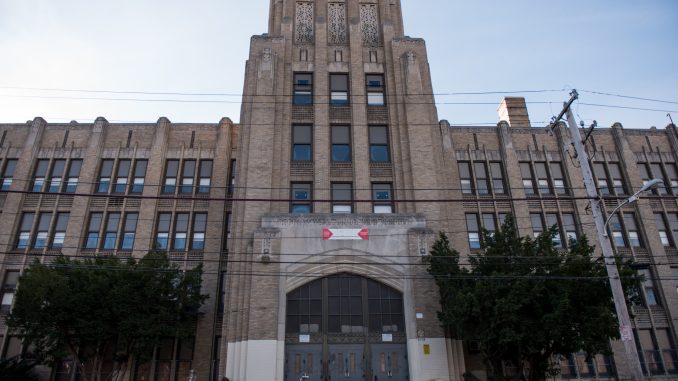
The Philadelphia Housing Authority purchased the aged building at 23rd and Master streets that used to be Roberts Vaux High School for $2 million. PHA plans to reopen the school this September. The School Reform Commission approved the sale in December.
Valerie Deas, 54, who lives on Seybert Street near 26th and graduated from Roberts Vaux High School in 1979, said she is unsure how the reopening will impact her community.
“It could possibly have a positive effect, but we’ll have to wait and see what happens there,” she said.
In June 2013, Vaux closed outright instead of the city’s original plan to reopen it as a K-8 school. Its students relocated to Benjamin Franklin High School at Broad and Green streets.
Now, PHA will invest up to $15 million for renovations to the building and $500 per student in subsidies every year.
Students from Morris and Meade elementary schools will have automatic admission, while others will be chosen through a lottery system, the Inquirer reported. The lottery would not factor in a student’s academic standing, according to the report.
Gail Turner, 64, who lives on Seybert Street near 23rd, said she has some questions about how the school’s reopening will change her neighborhood.
“What families will it bring to the neighborhood? Will it be higher income? Can the school provide a good education?” she asked.
Potentially, the school could be “a big boost” to the neighborhood, Turner added.
David Bromley, an adjunct professor for the College of Education, is the executive director of Big Picture Schools Philadelphia — the organization that will manage Vaux High School and design its educational plan.
BPSP is a part of Big Picture Learning Network, a nationwide organization founded in 1995 that has a “student-centered learning design” where students choose their own topics of interest.
“With a redevelopment of this size and with the history of the school district shutting down their schools, I can’t even begin to imagine how the community could even come close to trusting this process,” Bromley said.
In 2013, the School Reform Commission closed 24 schools throughout the city.
“[The community] has been through a lot of trauma,” Bromley said.
Still, Bromley said he hopes to dispel that distrust.
“We prove to [the community] that we can deliver, and that we can listen to these people,” he said.
BPSP is in the process of organizing a series of open houses throughout the community in order to hear their concerns and answer questions, Bromley added.
Bromley said he is working with community leaders and local politicians for community outreach.
“It’s going to be a lot of conversation,” he added.
Bryant Williams, 26, who lives on College Avenue near 22nd Street, said the absence of a neighborhood school created a negative impact on the kids in the area.
“Kids are being bussed everywhere,” he said. “Some of these kids could be doing something better with their life. They don’t need to be on the street.”
Paula Williams, 40, who lives on Master Street near Ridge Avenue shares the same opinion.
“They should have never closed it,” she said.
Currently, the school is behind other schools in the city, Bromley said. The enrollment process for the next school year started last fall, but the reopening was not approved until this past December.
He added that the enrollment process and staff hiring process will begin soon.
“There is a lot of work to be done,” he said.
Kelly Brennan can be reached at kelly.brennan@temple.edu or on Twitter @_kellybrennan.


Be the first to comment